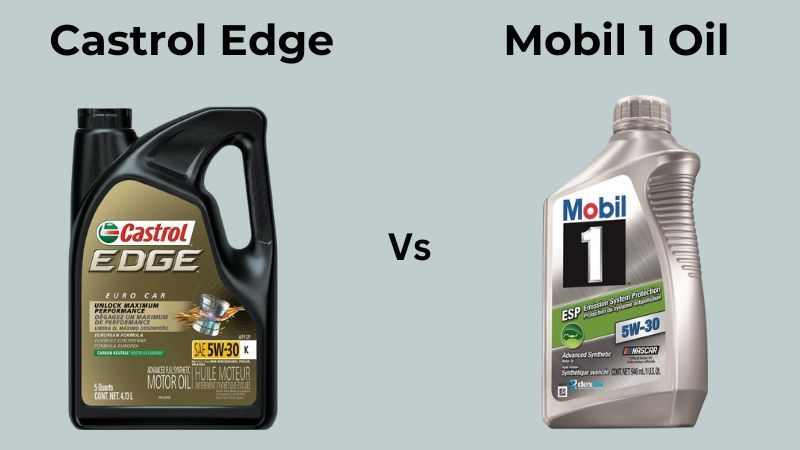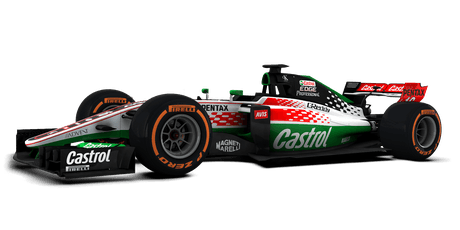Castrol vs. Mobil: comparing the engine oil legends
Published On 11/7/2024, 2:56:38 pm Author Uttkarsh SinghThe roar of engines, the blur of speed, the thrill of victory – these are the elements that come to mind when we think of motorsports, particularly Formula One. But behind every champion race car, there's a silent partner – the engine oil that keeps it all running smoothly. Let's discuss two giant competitors- Castrol and Mobil

Castrol's story begins in 1899, when Charles Wakefield S. C. Wakefield, a British businessman, founded the company. Initially, he focused on improving on existing lubricants, particularly for the harsh conditions faced by early automobiles. The name "Castrol" came from a type of castor oil used in the original formulations.
Contrary to Castrol, Mobil's journey didn't begin with its current name. In 1866, the Standard Oil Company was founded by John D. Rockefeller. This company quickly rose to prominence in the American oil industry, refining crude oil into various products, including gasoline and, of course, lubricants. However, in 1911, a landmark Supreme Court decision deemed Standard Oil a monopoly and ordered its breakup. This resulted in the creation of several smaller companies, one of which was the Standard Oil Company of New York (Socony). Socony eventually adopted the Mobil brand in 1966, marking the official birth of Mobil as we know it today.
The story doesn't end there. In 1999, Exxon, another major oil company, acquired Mobil. This merger paved the way for the creation of Exxon Mobil Corporation in 2010, a giant in the global oil and gas industry.
A Merged Future: Castrol and Mobil Join Forces
The year 1999 marked a turning point in the history of both companies. Exxon, which had acquired Mobil in 1999, merged its lubricant business with BP, which owned Castrol. This created a formidable entity, Castrol BP, combining the strengths and legacies of both brands.
While Castrol became the dominant brand following the merger, interestingly, Mobil continues to exist in certain markets, including India. ExxonMobil, the current entity formed by the merger of Exxon and Mobil in 2010, still uses the Mobil brand for its lubricants in India. So, while Castrol and Mobil operate under the same umbrella globally, Indian consumers might still encounter distinct branding!
Why Castrol appoints cricketers as Brand Ambassador
Castrol India has a long history of associating itself with prominent personalities. Cricket legends like Sachin Tendulkar, Kapil Dev, and Rahul Dravid have all been brand ambassadors for Castrol, leveraging their immense popularity to connect with the Indian audience. The current brand ambassador, Indian cricket captain Rohit Sharma, continues this tradition, associating sporting excellence with Castrol's commitment to performance.
The Unique Power of F1 Sponsorships
Castrol's association with Formula One goes beyond mere brand visibility. It's a strategic partnership forged in the crucible of high-performance motorsport. Since 1968, Castrol has collaborated with some of the most prestigious F1 teams, including McLaren, Williams, and Red Bull Racing. These partnerships serve as real-world testing grounds, pushing the lubricants to their limits. The extreme temperatures, intense pressures, and relentless speeds of F1 racing provide invaluable data for Castrol's engineers. This data is then used to develop next-generation lubricants that not only meet the demands of F1 competition but also translate into superior performance for everyday drivers.

ExxonMobil's involvement in motorsport, particularly with its Mobil 1 brand, is equally prestigious and impactful. Since its partnership with the McLaren team in 1995, Mobil 1 has become a staple in Formula One, as well as other racing disciplines like NASCAR and endurance racing. ExxonMobil leverages these high-octane arenas to test and refine its lubricants under the most demanding conditions. The extreme stress and performance requirements of motorsport provide ExxonMobil's engineers with critical data, enabling them to develop advanced lubricants. These products not only ensure peak performance on the racetrack but also offer exceptional benefits for everyday vehicles, including improved engine protection, efficiency, and longevity.
Mobil is nowhere close to Castrol in terms of F1 sponsorships.
While Castrol currently dominates the global lubricant market, Mobil holds a unique position in India despite the merger with Castrol.
How Mobil has placed itself in India
Mobil entered the Indian market much earlier than Castrol. Estimates suggest it arrived around the same time as Standard Oil (pre-Mobil) in the late 1800s, establishing a strong foothold before widespread competition.
In the pre-internet era, brand reputation heavily relied on word-of-mouth recommendations. Mechanics often formed strong opinions on lubricants based on real-world performance. Mobil's consistent quality likely led to positive word-of- mouth, solidifying its position in the minds of consumers.
In some cases, popular brands become synonymous with the product category itself. This is known as "genericization." For instance, many people in India might simply ask for "a tin of Mobil" when they need engine oil, even if they're open to other brands. This highlights the depth of Mobil's brand penetration in the Indian market.
Genericization can be a double-edged sword. On the one hand, it signifies strong brand recognition and consumer trust. Mechanics recommending "Mobil" can be very effective for sales, especially for loyal customers who trust the mechanic's judgment. Studies have shown that mechanic recommendations are a major factor influencing customer buying decisions for car care products, including engine oil.
On the other hand, genericization can also lead to customers being less aware of specific product features or benefits. If a customer simply asks for "Mobil," they might not be aware of the different Mobil oil options available, each suited for various driving conditions and vehicle types.
Who wins?
Mobil's early entry, consistent quality, catchy name, and strategic continuation as a brand have all contributed to its association with engine oil in India. That being said, since the merger of Castrol and Mobil in 1999, both brands are owned by the same parent company, ExxonMobil. So, whether you choose Mobil or Castrol, ultimately the profit goes to the same entity!
















